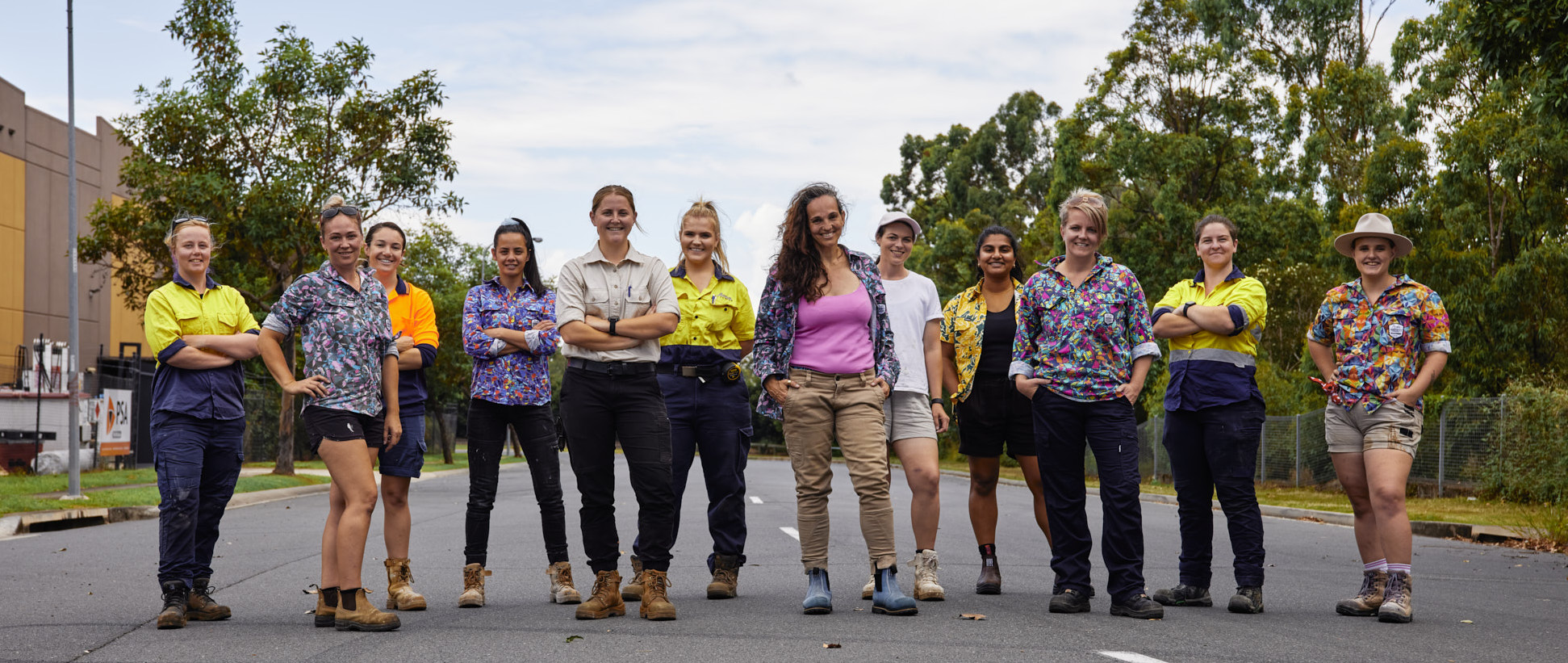
NAWIC QLD Women on Tools (WOT) 11% Strategy
%20(1).jpg)
 (1).jpg)
 (1).jpg)
 11% Strategy/trtrtrtrtr.png)

Equalising the Queensland Building Plan
In 2015 NAWIC Queensland invited a variety of stakeholders to discuss and strategise ways to improve engagement with apprentices and tradeswomen, how to better support them and how to attract more women and girls to trade careers. As a result, the Women on Tools (WoT) Committee was formed and within a year had developed a strategic plan for attraction, engagement and advancing the interest of women in trades. In 2016 the WoT committee wrote a white paper to the QLD State Government proposing several initiatives including a target of 11% participation of females in frontline roles on all QLD state government building and construction sites. QLD State Government agreed to potentially review the procurement policy if NAWIC QLD WoT could develop a strategy to support the industry with creating a pool of female applicants, improving the culture and supporting the existing tradeswomen workforce. As a result, the 11% Strategy was born, this is a holistic strategy focusing on six key priorities:
- Attracting and retaining women in apprenticeships and traineeships
- Developing industry pathways for women in para-professional and professional careers
- Repositioning women as employees of choice in non-traditional careers
- Passport to Diversity – changing the industry culture
- Industry commitment to gender equality and accessibility to the trades
- Recognising the skills of women already working in the industry
A recent
Construction Skills Queensland, Women in Construction Report has seen a 50%
increase in apprenticeship uptake since actions from the 11% Strategy was
implemented in QLD. The NAWIC QLD WoT committee has reached many key milestones
and achievements, some of which are listed:
•
Developed an online Diversity and
Inclusion Awareness training session which was developed by tradeswomen in
partnership with TAFE QLD Skills Tech, with input from a Bond University
professor and industry stakeholders.
•
Developed and implemented a Male
Allies Program in partnership with emberin, which is an online structured
mentoring program for men.
•
Developed a Diversity and Inclusion
Kit to support employer’s recruitment strategies and provide targeted
information to female applicants wanting to get into the industry.
•
Engaged with hundreds of school
students providing them with a range of activities including ‘Speed Careering’
events, ‘Career Advice’ webinars and the ever popular ‘Try a Trade’ days.
• WoT Toolbox style breakfasts hosted
across the state attracting hundreds of participants, including political
guests, who receive industry-specific, current and female relevant information
from an amazing group of industry stakeholders and supporters.
•
Supported the Qld Government’s
Housing and Public Work’s Exemplar Project with advice and resources to help
dispel myths and demonstrate benefits of implementing a diverse and inclusive
workforce on a construction site.
As the
success of the early implementation actions continue to deliver results, we are
already focusing the journey ahead with the “Next Steps” initiative.
“Next Steps”
- Hosting round table events with industry leaders to build on the conversations started and ensure the strategies being implemented are collaborative solutions for changing the culture of the building and construction industry.
- Targeting organisations who employ a direct workforce of apprentices, trainees and existing workers to offer support and provide them with the new suite of resources developed to help these organisations to embrace a cultural change to employing, retaining and developing women.
- Continuing to promote and encourage employers to join the Male Allies Mentoring Program to encourage participation onsite.
- Expanding on the delivery of the Diversity and Inclusion Awareness training to be delivered at toolbox meetings, including state-wide in collaboration with TAFE Queensland.
- Hosting events to support the 'How' and 'Why' of finding, hiring and retaining women in frontline roles in the construction industry.
- Creating a pool of female applicants by partnering with Community Based Organisations to provide education, advice, support and mentoring for Skilling Queenslanders for Work (SQW) programs that focus on women in non-traditional such as the Cert I in General Construction. Develop infrastructure to support linking employers with SQW and other entry level training female participants looking for work experience.
- Expanding the NAWIC QLD Mentoring program to be delivered as a structured program to SQW and entry level training participants.
- Continue to promote trade pathways to secondary schools including the introduction of NAWIC QLD WoT Tool-Box style breakfast info sessions at high schools where industry stakeholders can provide live demonstrations and the female students can engage with tradeswomen and female apprentices face to face.
- Expansion of the NAWIC QLD mentoring program to include and focus on tradeswomen and apprentices by growing the number of mentors who are qualified tradeswomen (particularly those that run their own trade related small business). This will ensure that mentees are partnered with a mentor who can relate to the experiences they face in their day-to-day site culture.
- NAWIC QLD WoT will work with other chapters of NAWIC and the National Board, to replicate the NAWIC QLD Women on Tools Committee in other regions where appropriate, to try and gain similar momentum across Australia.
NAWIC
QLD WoT will continue to advocate for change and to secure the 11% target on
Queensland government funded infrastructure projects and maintenance work.
NAWIC QLD 11% Strategy Presentation
Women In Construction, Exemplar Project Outcomes Report